In the lead-up to Racing 92’s Champions Cup semi final with Munster, Laurent Labit was not letting his players get off the training field without getting their act together.
Professional rugby teams have got to the stage, now, where the block off training sessions to work on specific areas of the game. You get one run-through, maybe two. Then you move on.
For Labit, and Racing, defensive drills were run again and again, and again… and again.
There were grumbles, of course, and sore bodies afterwards, but the Racing players bought into what their coach was insisting upon. Munster were going to come at them and they were going to give it right back to them.
To beat Munster, Racing knew they had to neutralise their leaders, target their set-piece and, above all else, win the breakdown battle. Having the likes of Viremi Vakawata and Teddy Thomas would help – and it did – but this match would be won up front, and by all 15 players ready to climb into Munster.
If the likes of CJ Stander, Jean Kleyn and Peter O’Mahony had quieter than usual games, it was because Racing were in their face early, often and with snarling success.
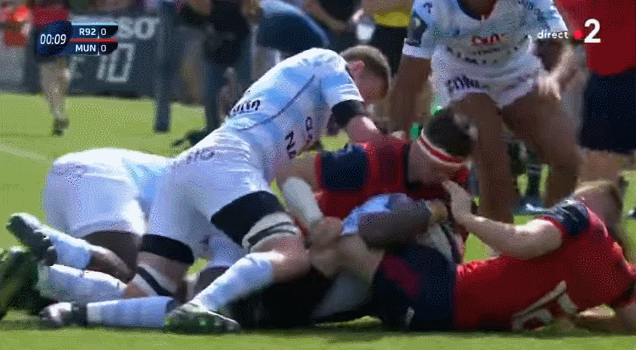
Some fans lamented Munster’s lack of leaders but if they went missing at crucial times, it is only because they were buried in Bordeaux.
‘Barring up’
The ferocity of Racing in the first half – with particular emphasis on the first 20 minutes – was astounding. Whether it was Wenceslas Lauret clearing out like a demon, Thomas roughing up any Munster man he could find or Cedate Gomes Sa proving to be a complete pain in the arse, Racing were wired in from the get-go.
Donnacha Ryan spoke with The Hard Yards after his side’s 27-22 victory and confirmed that Racing went after the lineout and sought to deny Munster any momentum on first phase ball.
“We learned massively from the U Arena game,” he said. “We had a chat with ourselves and, if we’re being honest, we were lucky to win.
“Munster went after first phase ball and they could have done whatever they wanted after, on the next phase. So we really tried to bar up and really target the first breakdown. It allowed or forwards to get a fold.
“It’s like any team, I suppose. If you are able to bar up at 12, you can fold around a lot easier. But if it’s a soak tackle, you have to go an extra five yards deeper to get the fold. The way Munster are drilled, they are able to get the presentation [right] for Murray and it is very, very hard to defend. That was a big plus for us and something that helped us in the first half.”
There is no better example of Racing targeting Munster off the first phase – bundling their chips in – than Vakawata wrapping up Rory Scannell and, with the help of two supporting teammates, turning him over feet from the tryline with seconds to go before half-time.
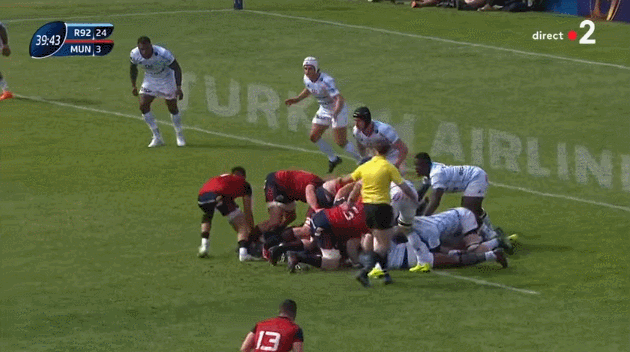
The chop tackle – used to devastating effect by Wales in recent years – was also on show.
Henry Chavancy (seen chopping Stander below), Marc Andreu and Bernard La Roux were front and centre for this tactic, with the likes of Nyanga and Gomes Sa going high as their teammates went headlong and low.
Stander, Dave Kilcoyne and Kleyn are often the men that punch holes but they were gang-tackled and stopped dead. Stander ran hard all day but his 21 carries had a return of 27 metres gained. He was stuffed in bottle.
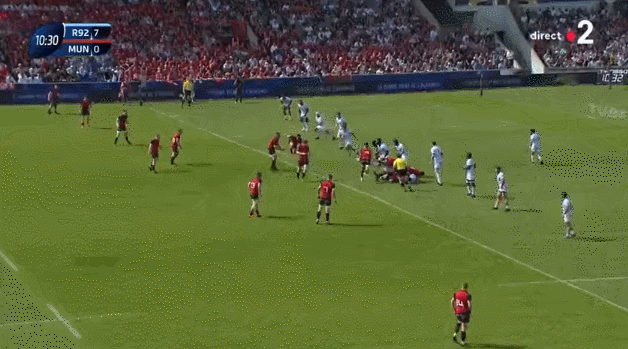
The entire Munster pack had 70 carries for a metres gained return of 83 and just the one line break
Rattled early
Keatley is very much a confidence player but there were so few good moments for him to ever grow into the game. He had a couple of loose passes, and we will later look at that rash drop goal attempt, but Keatley blew an early chance to put Racing under pressure by botching a kick to touch.
Stander had just won a superb turnover on the Munster 10-metre line but Keatley tried to get the maximum return on his kick. Rather than removing any doubt of a quick Racing throw and putting his kick well out, Keatley got his connection wrong. The ball landed into the grateful arms of Louis Dupichot, who hoofed a kick back that ended up going out around the Munster 10m line.
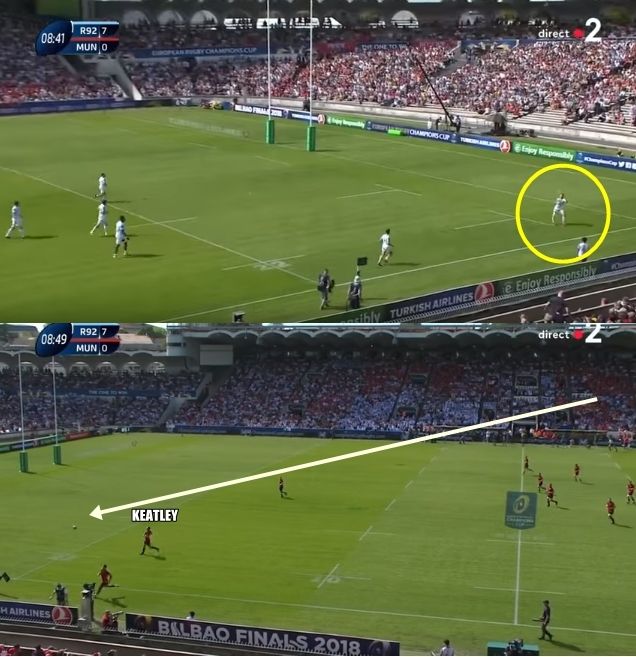
All that good work for nothing. Keatley berated himself for the error but his game faltered further and he was withdrawn after 53 minutes.
Munster’s first lineout came as early as the second minute and was pre-planned. Former Munster centre James Downey noted, on The Hard Yards, that the team would often have two or three early lineouts mapped out to get them settled into the contest. Lineouts called later in the game would often be called on the fly, or to suit the situation.
Munster’s first was disrupted to the extent that Niall Scannell, under pressure, popped a crooked pass to the front of the lineout before taking off up the pitch. The whistle sounded and Racing were awarded their own throw. The Racing players got in the hookers face, with Maxime Machenaud shoving him to the ground.
Johann Van Graan’s men won 13 of their 17 lineouts but only eight were clean catches or quick deliveries. Munster winger Keith Earls admitted to us that Ryan, once again, was a key figure in this Racing tactic.
“I think between Donnacha, Billy [Holland] and Pete [O’Mahony] they would have been the players that would have had a massive hand on the Munster line-out over the last few years. They know each other inside out and Donnacha and Billy would have had some mind games during the week.
“He was massive for them and even before half-time we had a line-out and CJ went through the middle of the line-out and low and behold it’s Donnacha that tackles him just before the line.
“I think if he wasn’t there the French teams don’t do as much research and analysis as [other] teams and Donnacha Ryan is a freak when it comes to that stuff.”
Munster’s first attacking lineout in a dangerous position arrived after 12 minutes. The plan was to go up in two pods as a diversion from the real play – to pop the ball down to Stander on the burst. It was executed well but Ryan was there – as Earls said – waiting.
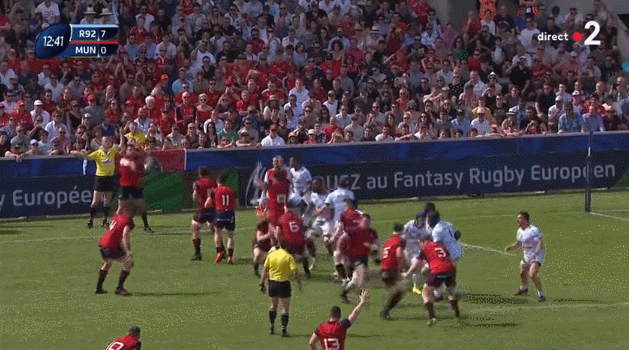
Four phases later and Munster, having turned down a kick at the posts 90 seconds earlier, went for Plan B – drop goal in front of the posts. Presumably this had been discussed beforehand with the idea being to come away from trips to the 22 with whatever points they could get. If Keatley landed an early drop goal, they could drop him back later in the game and feint the Racing defence.
The only problem was that the Keatley drop goal was telegraphed. Yannick Nyanga slowed down Munster ball so much that half the Racing side saw Keatley drop into the pocket. By the time Murray dished him the ball, the outhalf was fast running out of space. He needed to get rid of his kick and get it high. Instead, the kick looked rushed and did not clear the 7-foot (max) of an outstretched Eddy Ben Arous.
Murray should have known the kick was not on at that time. Keatley should have known not to take the kick on. To compound matters, although Munster were reeling back to their 22, Rory Scannell took a pop with his left boot from 25 metres but his drop attempt sailed left and wide.
If ever a phase summed up Munster being rattled by Racing’s aggression and organisation, this was it.
O’Mahony said Munster were sick of learning lessons after their latest semi-final failure. They are on course for a PRO14 semi, next month, so their supporters hope they learn something before they lace up for their next dart.
At the very least Munster were spared Reggie Corrigan and ‘intensity’ questions in their post-match interviews on BT Sport.



























